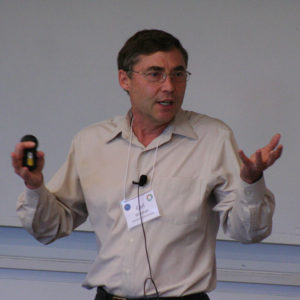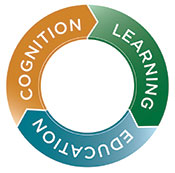
Nobel Prize-winning physicist Carl Wieman will discuss how to transform undergraduate science education at a lecture Aug. 22, launching a new initiative of the Office of the Provost.
Wieman will give a talk, “Taking a Scientific Approach to Science and Engineering Education,” at 4 p.m. Monday, Aug. 22, in Knight Hall’s Emerson Auditorium at Washington University in St. Louis, followed by a reception. RSVP here to attend.
His lecture marks the beginning of a new universitywide initiative that will focus on methods of teaching science, technology, engineering and math to undergraduates: the Transformational Initiative for Education in STEM (TIES).
The Center for Integrative Research on Cognition, Learning, and Education (CIRCLE) will oversee the initiative, led by Gina Frey, co-director of CIRCLE, executive director of the Teaching Center, and the Florence E. Moog Professor of STEM Education; Mark McDaniel, co-director of CIRCLE and professor of psychological and brain sciences in Arts & Sciences; and Kathy Miller, chair and professor of biology in Arts & Sciences.
TIES is an outgrowth of the university’s earlier work as part of the AAU STEM Education Initiative.
“Carl Wieman has been a persuasive voice in reforming science education,” Provost Holden Thorp said. “His ideas are having a transformative effect around the world, and this is a special opportunity for our faculty to hear his findings and recommendations firsthand.”
 Frey said TIES builds on progress the university already has made through the AAU initiative, which supported evidence-based changes made to individual introductory science courses in departments such as biology, chemistry and physics.
Frey said TIES builds on progress the university already has made through the AAU initiative, which supported evidence-based changes made to individual introductory science courses in departments such as biology, chemistry and physics.
“What we saw again and again was that faculty became excited about the chance to make informed improvements to their courses with implementation support from The Teaching Center and evaluation support from CIRCLE,” Frey said.
“TIES will allow us to bring about broader change by expanding the focus from individual courses to multiple courses throughout two departments: in biology and in psychological and brain sciences,” Frey said.
Wieman, professor of physics and of the Graduate School of Education at Stanford University, served as associate director for science in the White House Office of Science and Technology Policy from 2010-12. He will discuss ways to apply research on how people learn to transform education. Learn more about his approach to bringing systemic, sustainable changes to science education on a broad scale.
Wieman won the 2001 Nobel Prize in Physics, after which he shifted the focus of his work to improving teaching and learning in STEM fields. While Wieman’s lecture is on undergraduate-level science teaching, the underlying principles are valuable and can apply across disciplines, Frey said.
In addition to his public lecture, Wieman will spend a day with the university’s TIES project team to review and refine plans for getting started. Departments will work with the TIES team to integrate evidence-based teaching methods into introductory and higher-level courses.
The Departments of Biology and Psychological and Brain Sciences — which include some of the most popular undergraduate majors at the university — are first to participate, and other departments will take part in the future.
For more information, contact TIES Program Manager Erin Solomon.
Comments and respectful dialogue are encouraged, but content will be moderated. Please, no personal attacks, obscenity or profanity, selling of commercial products, or endorsements of political candidates or positions. We reserve the right to remove any inappropriate comments. We also cannot address individual medical concerns or provide medical advice in this forum.